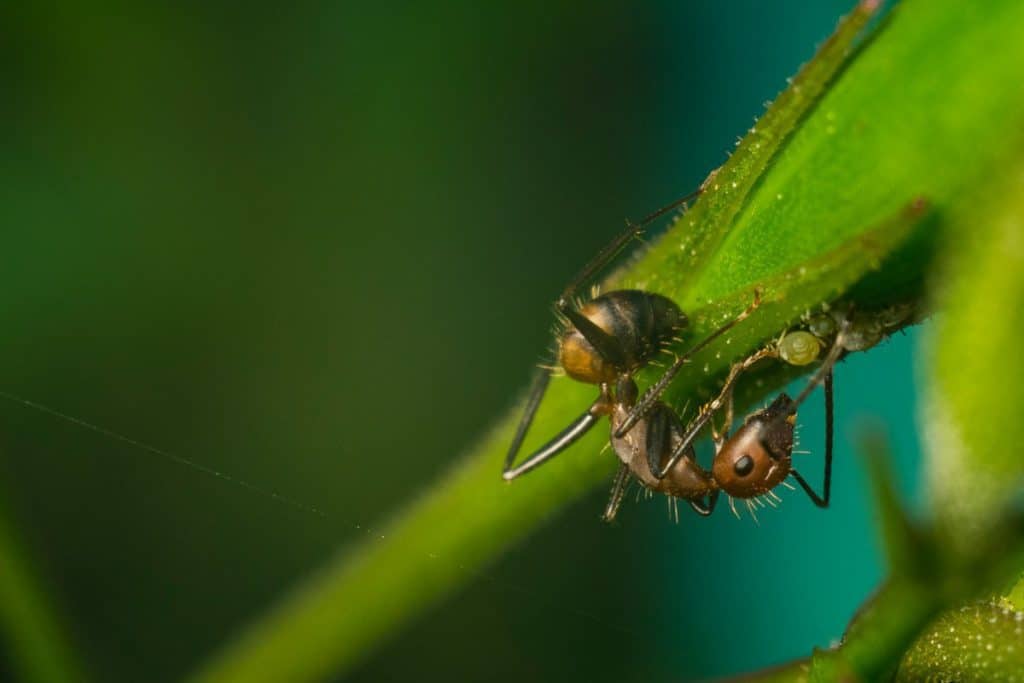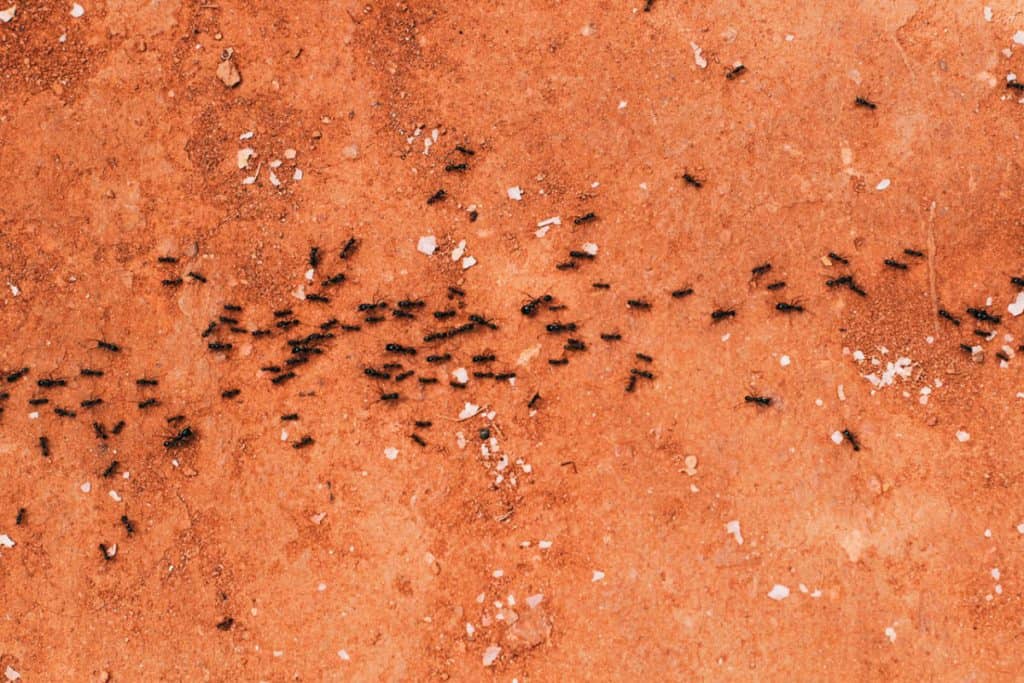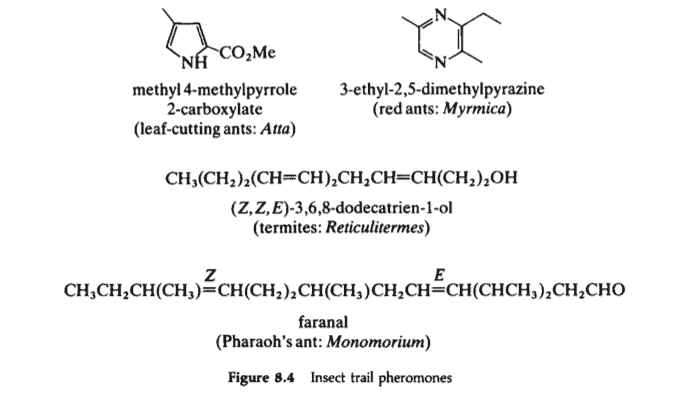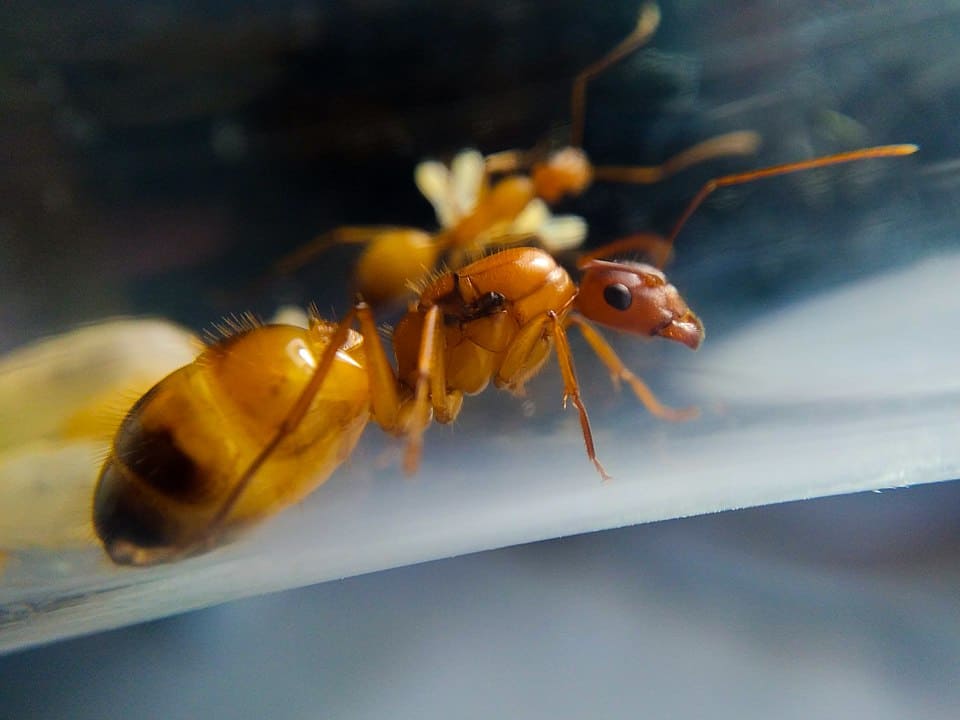
Why Do Dead Ants Attract Others?
When you squish an ant, chances are there will be more arriving shortly. This is due to the fact that dead ants emit specific chemical signs that their nestmates can sense.
It might seem like there are more ants arriving to defend or even avenge the death of their dead buddy. However, that’s most likely not the case. The ants are just arriving to take care of the dead body and ‘bury’ it, in a way.
Yes, you heard that right. Ants have their own burial rituals. And they can sense the smell of death. But how exactly does that work? Keep reading to find out the details.
If you enjoy reading this article, why not check out our articles on Where do ants hide? Let’s find out and Ant Farms Gel vs Sand, Which is Best?
Why do ants pick up dead ants?
If you’ve ever seen a large number of ants, or stumbled upon an anthill, you may have noticed a dead ant being carried away by another ant.
It is not uncommon to find a single ant carrying another, or even to see a group of ants hauling away a dead companion.
This may have come as a shock to you, but the answer is actually simpler than you think, and you’ll definitely want to know why.
The answer is quite simple: ants carry dead ants to reduce the risk of contamination or infection.
In other words, ants do this because it gives them evolutionary advantage. Colonies who ‘bury’ their dead have a greater chance of survival than the ones that don’t.
Why do ants carry their dead?
Some insects, ants included, actually bring their deceased members away from their hive to a “cemetery.” While they may not directly bury their dead, it’s interesting to see how ants understand death on such a complex level. This behavior is called necrophoresis.
If you ever notice a dead ant being carried away, you’ll want to pay close attention to where these ants take their killed members because chances are you’ll find more dead ants in the same place.
This place is called a midden.
Ants are extremely strong – so strong that we wrote a whole article about it! Read it here: How Strong Are Ants Compared to Humans?
What’s a midden?
When thinking about an ant midden, think about it as an ant dumpster. Ants will carry away waste, contamination, and even their deceased hive members. Therefore, not only is a midden a form of ant dumpster, but it also serves as a burial ground.
The midden, in the world of ants, is a sacred and grimy place. This is where an ant hive will dispose of waste, corpses included. The interesting fact is that they’re not that far off from cemeteries, and shows that ants share some similarities with human beings.
Do dead ants attract more ants?

Dead ants will definitely attract more ants. However, they will most likely not appear in huge numbers. Rather, other worker ants who happen to be in the vicinity will come and take care of the dead body – by taking it to the trash pile.
As we’ve briefly mentioned during the intro, dead ants release pheromones upon death. Once they’re fluids flow out, other ants in the area will get a signal of danger.
If it’s a danger signal, why would that attract more ants?
While it may be a signal that represents danger, that doesn’t mean that it instantly scares ants off.
Ants are actually pretty smart creatures, and they’ll tend to investigate their dead hive members before carrying them off. This can cause quite a few ants to show up once they come across a dead member of the hive and might be the main reason you end up seeing them.
What chemical do ants release when they die?
When an ant dies, as we’ve mentioned throughout the article, they release pheromones.
Pheromones, at their core, are chemicals that send signals to other ants. This type of communication is not unique to ants. Most social insects (and not only them) use pheromones to communicate. So do many other vertebrates, including even humans!
In the insect world, pheromones can signal death, sexual desire, and even food sources. When looking at ants, though, this pheromone tends to be a fatty acid.
What chemicals are in ant pheromones?
All sorts of molecules can act as pheromones. In the end, which kind of molecules are significant depends on who is sensing them (usually by using the sense of smell) and interpreting their meaning.
Ants, in particular, have a very strong sense of ‘smell’. That is, they do not have noses, but they have very precise chemical receptors in their antennae and feet which give them something similar to the sense of smell.
Besides the “death pheromone”, ants have the ability to sense various other signals. Perhaps the most notable is the trail pheromone, the chemical signal that makes ants follow the same invisible path (you’ve surely noticed this if you’ve ever watched a colony of ants!)
But, to make things even more complicated, each species of ants has its own unique chemical signature. That is, the pheromones released by different ants can have totally different chemical compositions.
For example, here is an illustration of the chemical structure of trail pheromones secreted by different ant species:

Therefore, it’s difficult to talk about the exact chemicals that ants release. That’s a complex question best suited for biochemists. But, what we can essay is that many insect pheromones are fatty acids and molecules derived from these acids,
What we do know is that the pheromone which signals death is oleic acid,
What is oleic acid?
Oleic acid is a fatty acid and is actually present in quite a few different plants and animal species.
The acid is monounsaturated and is an omega 9 acid. It is often said that oleic acid has no smell, but this is not entirely true. It is true that the substance is odorless for humans, but the highly developed senses of ants can definitely ‘smell’ oleic acids.
Cockroaches also release oleic acid when they die, read more about it in Why Do Cockroaches Smell? The Curious Answer
Ants might not seem like they have a whole lot of fluids upon their demise, but that small splatter left behind is strong enough to signal the entire hive.
How do we know about all of this?
But how do we know all these things about ants? How have scientists figured out how ants communicate? Well, a lot of what is known now about ant communication would not be possible without one man: Edward Osborne Wilson.
Although pheromones as a means of communication were discovered by other scientists before him, Wilson (nicknamed the “ant man”) discovered a lot about how pheromones in ant colonies by observing them.
Wilson noticed the habit of ants to carry away their dead conspecifics, and he was determined to find out what exactly makes them do so.
Through lots of trial and error and playing with stinky chemicals, Wilson managed to find the answer: it was oleic acid.
And, he tested this theory by applying oleic acid to living ants. As for what happened after, you can read it in Wilson’s own words:
“To test this conclusion about the simplicity of ant behavior I asked, finally, what would happen if a corpse came to life? To find out, I daubed oleic acid on live workers. Their nestmates promptly picked them up, even though they were struggling to get free, and carried them to the refuse pile. There the “living dead” cleaned themselves for a few minutes, rubbing their legs against their body and washing the legs and antennae with their mouthparts, before venturing back to the nest. Some were hauled out again, and a few then yet again, until they became clean enough to be certifiably alive.”
E.O. Wilson (Naturalist)
If you’re interested to learn more, you can start by watching this awesome interview with E. Wilson.
But is that the whole story?
Wilson’s discovery – that the smell of oleic acid makes ants believe an ant is dead – still holds true. But scientists are not sure this is the complete story. That’s because ants seem to start smelling like oleic acid only after a while (say a day or two), but sometimes, they are carried away to the graveyard much faster.
Another theory is that ants constantly have pheromones for both life and death being emitted. This would mean that once they die, the only pheromone remaining is that of death.
As it turns out, the ‘smelly; communication ants use is incredibly complex, and we still have a lot to learn about it!
Do ants play dead?
Not a lot of insects have the mental or instinctive capacity to play dead, but with ants, that’s a different story.
While this doesn’t occur in every species of ants, recent studies have actually shown that some ants do happen to play dead when danger presents itself.
So while some ants will definitely play dead, it’s actually quite a rare sight to behold. This is likely due to the fact that hive genetics play a role, and there is quite a variation between ant species as well.
What species play dead?
Fire ants tend to be the most common species when it comes to playing dead because these ants are actually quite aggressive towards other colonies
. Therefore, if an enemy troop comes to investigate what appears to be another dead ant, that ant actually might instead just be faking it. Plus, moments later, it might even get up and start scurrying away.
While this is pretty common among certain young fire ants, this is not true for fire ants of all ages. As ants grow older, they tend to grow out of this trait.
This means that ants that are in the midst of their lifespan, or on the older side, will tend to stop playing dead.
Researchers are not sure why this change occurs, but it’s most likely a result of growing more aggressive with age. Young ants are typically smaller than older ants and pack less of a punch when it comes to fighting back.
Fire ants are very interesting, we talk about them in several articles, here’s one you might be interested in: Can Fire Ants Kill Your Pets?
Not much is known about this type of practice in ants yet, but it appears to be a genetic trait that is passed down from generation to generation. A lot of this has to do with the queen, and the particular hive these fire ants come from.
Do ants avoid dead ants?
Ants will only avoid dead ants if danger is still present in the area, or if the dead ant has been carried off to the midden. If an ant is freshly killed then chances are they’ll carry the ant off to a midden. The simple answer to this question is no, but in some cases, there might be a reason for an ant to avoid a dead ant.
So when do they avoid dead ants?
Ants will only avoid dead ants once they’re in the midden, or if danger is still present. While ants may smell the pheromones released upon an ant’s death, they’re not always sure what caused it. This will likely cause other ants to investigate. If danger is present, they’ll leave their companion behind. If there is no sign of danger, they’ll carry their dead off to the midden.
Ants are well aware of the fact that a decomposing corpse can leave with it infections, ailments, and cause harm to the well being of the hive. This is why dead ants will initially carry their dead to a midden, because it will decrease any risk to the hive.
What happens when a queen ant dies?

This is always a big question when it comes to ants and death because the queen plays a huge role in the hive. The ant queen makes sure things run smoothly, elects roles, and makes sure that the hive has fresh new members on a steady basis. The queen ant is literally responsible for reproduction, and actually lays thousands of eggs. Without the ant queen, the hive is going to be in some real danger, and the queen is not replaceable.
So what happens when she dies?
When the queen ant dies, as with most ants, her corpse will be carried off to the midden. The death of the queen ant is far more significant than the death of a regular hive member. This is due to the fact that once the queen ant dies, the ant population will no longer be able to reproduce.
Therefore, once the queen ant dies, the rest of the colony will die along with her. This will not happen instantly, but eventually, the hive will be no more.
The queen ant gives life to the colony, and when her time is up, the time of the entire hive is up. This is why you’ll find queen ants guarded at a central location of the hive, and never roaming the surface.
If you’re reading this article from the perspective of someone who’s dealing with an ant infestation in your home or garden then I’d just recommend getting a Indoor/Outdoor Ant Control Kit. It’ll take care of the problem quickly and effectively.
Conclusion
Ants may be small insects, but that doesn’t mean they lack complexity. Ants, as a species, are pretty capable of making complex decisions.
This is why when an ant dies, an appropriate ritual ensues. Just like human beings, ants remove the corpse and carry it off to a burial location.
Therefore, while they may seem insignificant, ants actually mirror a lot of human behavior. They all have roles, complete tasks, and even have the ability to dispose of waste along with the dead.
If you enjoyed reading this article, why not check out our articles on Are Ant Farms a Bad Idea? Let’s Discuss and Do Ants Hibernate in the Winter? Let’s Find Out
P.S.
That’s it for this article. I hope you enjoyed reading it and if you think it might be useful for someone else then please share it on social media, email or your own website! It really encourages us to write more content and grow the site!
All the best
Steve
Sources
Choe, D.H., Millar, J.G. and Rust, M.K., 2009. Chemical signals associated with life inhibit necrophoresis in Argentine ants. Proceedings of the National Academy of Sciences, 106(20), pp.8251-8255.
Harborne, J.B., 1993. Introduction to ecological biochemistry. Academic press.
Tristram, W. 2015. How Animals Communicate Via Pheromones. American Scientist. Retrieved from: https://www.americanscientist.org/article/how-animals-communicate-via-pheromones
Krulwich, R. 2009. ‘Hey I’m Dead!’ The Story Of The Very Lively Ant. NPR. Retrieved from: https://www.npr.org/sections/krulwich/2009/04/01/102601823/hey-im-dead-the-story-of-the-very-lively-ant
Wilson, E.O., 1963. Pheromones. Scientific American, 208(5), pp.100-115.
Wilson, E.O., 1994 Naturalist. Island Press.
Recent Posts
Tiny Black Bugs in Bathroom NO WINGS: What They Are and What to Do!
Finding tiny black bugs in your bathroom can be uncomfortable, to say the least. Especially if they are persistent, or they appear in very large numbers, which they often like to do. When it...
Tiny Black Bugs in Plant Soil - What Are They & What To Do About It
A short horror story: You get a new houseplant. You do your best to take care of it. You’ve ensured that it has the right soil, the right amount of sun, it gets enough water. And then one day, you...

